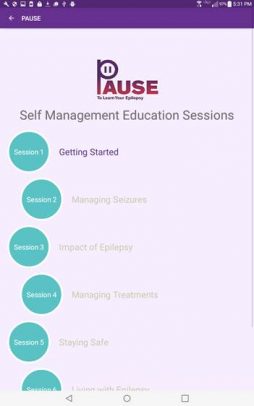East Meets West: Using technology to help epilepsy patients

Researcher Dilip Pandey and collaborators are helping break barriers for patients who have epilepsy. (Photo: Jenny Fontaine)
East Meets West is a collaboration of Provost Susan Poser and Vice Chancellor for Health Affairs Robert Barish.
Epilepsy, a seizure disorder, affects more than 2 million people in the United States, making it the fourth most common neurological condition in the nation, according to the Epilepsy Foundation.
Still, the general public doesn’t know much about the chronic condition.
College of Medicine faculty member Dilip Pandey said lack of information isn’t to blame.
“There are volumes of information,” said Pandey, associate professor of neurology and rehabilitation.
Two large roadblocks remain for people with epilepsy, especially those who are part of underserved or disadvantaged populations: lack of accessibility and information overload.
 Pandey and collaborators are helping patients overcome those barriers with a customized, self-management education program called PAUSE (Personalized Internet-Assisted Underserved Self-management of Epilepsy) to Learn Your Epilepsy.
Pandey and collaborators are helping patients overcome those barriers with a customized, self-management education program called PAUSE (Personalized Internet-Assisted Underserved Self-management of Epilepsy) to Learn Your Epilepsy.
The program has four crucial components — baseline and follow-up questionnaires, a tablet with a mobile application and real-time web conferencing — which researchers hope will improve patients’ symptom management to keep them healthy and reduce emergency room visits.
To begin the process, patients are asked to set goals and list ways that they could improve their symptom management for the first 10 to 12 weeks with their tablets, then for three months, six months and a year after.
“We’re reporting, ‘What are their goals for this? What do [patients] want to get out of this?’” said Marie Chesaniuk, a doctoral candidate in clinical psychology and research assistant. “We ask them so it’s more about what they want or at least acknowledging their needs.”
Since most patients report not knowing how to achieve those goals, Pandey said, PAUSE collaborators, patients and their health care team — composed of health care providers and case managers — work together to identify them. Then, the providers choose which education sessions to include on tablets. Patients have access to needs-based self-management resources, gathered from the Epilepsy Foundation’s website, to review at their own pace for up to three months.
Learning modules, a seizure diary and other features are available for patients to use on the app, thanks to work done by engineering students and recent alumnus Himanshu Anand, who received his master’s in computer science from UIC in May.
“We strove to make the tablet application engaging for the user,” said Anand, who has experience in Android development. “I tried to incorporate the latest Android features, I looked at other health care applications, and then I brainstormed ideas with everyone.”
After conducting one-on-one video calls with patients, Nadia Nabulsi, who received her master’s in May from the School of Public Health, shared recommendations for improvements with the team. Feedback from patients inspired Anand and Nabulsi to create a progress bar.
“A lot of people would say, ‘I don’t remember where I left off,’ so we talked about ways that we could make that work,” she said.
Nabulsi’s responsibilities also included tracking the implied challenges and impacts of epilepsy on patient’s lives by categorizing negative and positive comments made by patients during calls. Chesaniuk’s research assesses whether setting and meeting clear, actionable self-management goals improve patients’ quality of life.
“Analyzing the follow-up data will be our next step,” said Katharine Ozenberger, a doctoral student in the College of Pharmacy. Ozenberger, who is completing a pharmacoepidemiology certification program at UIC, has created a database to organize and gather information for over 100 patients; more than 50 percent are from the UI Health neurology specialty clinic.
By 2019, researchers hope to recruit 200 patients for the study — 100 will come from the UIC clinic and another 100 will be enrolled from the community through the Epilepsy Foundation of Greater Chicago, a project collaborator. The PAUSE study is also part of the Managing Epilepsy Well Network, a national network of scientists and community partners.
Jeffrey Loeb, the John S. Garvin Endowed Chair in Neurology at UIC, is a co-principal investigator on the PAUSE study. Associate professor Yevgenya Kaydanova, an epileptologist, and assistant professor Woojin Song, a neuropsychologist, from the UIC College of Medicine are co-investigators. Inseya Lakhani, an undergraduate student in neuroscience, is also part of the project.
Categories
Topics
app, East Meets West, engineering, epilepsy, health care, neurology, seizure, technology
